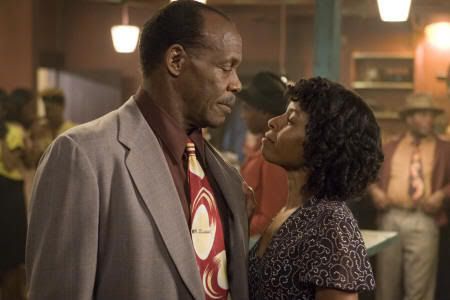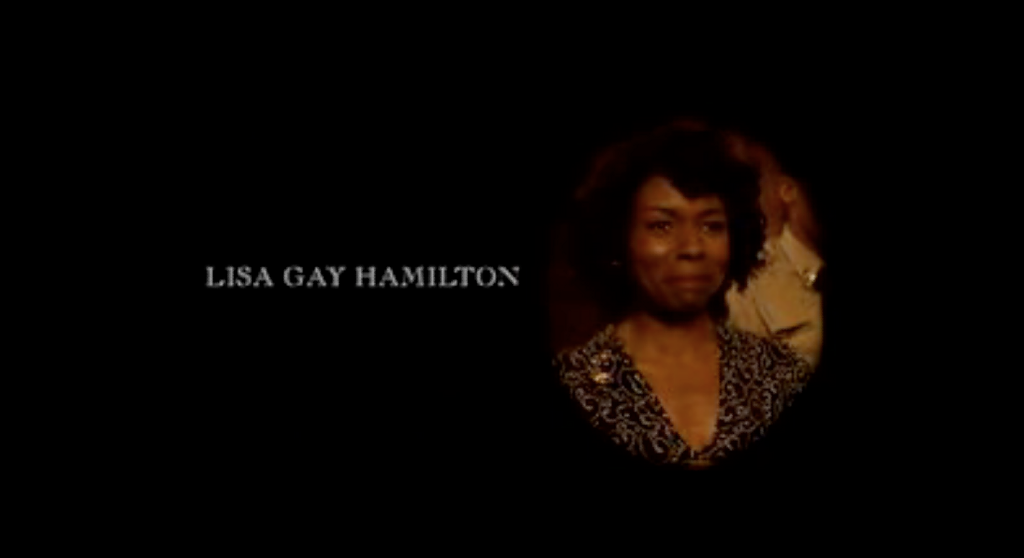stats not available
Lisa Gay Hamilton plays Delilah Purvis, a hard-working woman in 1950's Alabama. She's the patiently devoted wife (to Danny Glover's PineTop, proprietor of a struggling juke joint); the protective mother (to Yaya DaCosta's -- yeah yeah, that Yaya -- China Doll, a delicate beauty with a heart condition); and the attentive domestic (of Mary Steenburgen's Amanda Winship, a sad wealthy white woman). Yet amidst this bundle of stock character tropes, Hamilton's Delilah is also a complex person with an independent inner life: she's a woman with a discomfiting past, who's anxious about the present and frankly fearful about the future.Most conspicuously, the film's title refers to the name of PineTop's juke joint, but it seems to me that the title also cues the tone and style of John Sayles's confident filmmaking. Honeydripper is a movie that takes its sweet time to honor its complicated characters as they discover their ability to trust in miracles. Sure, Honeydripper moves slowwwwwwly, its internecine map of distinctive characters sauntering an easy weave with little concern for the film's wisp of a plot. Yes, Honeydripper is also densely sweet. With anyone but Sayles at the helm, this piece would likely make most sense on the Hallmark channel. And it might be easy to fault this film for not moving with a Frank Oz-ian subtlety or with a Chris Columbus-ian nuance. Yet, under Sayles's assured hand, there emerges an artisanal richness in the sweet, a soulful pungency to the slow, which transforms Honeydripper's treacle into something nearly transcendent. Indeed, Honeydripper elevates the formulaic, feel-good music narrative to the realm of a quiet sublime. In Honeydripper, music operates with redemptive power -- as a catalyst for valuing memory, history, futurity, community, and self. And no one character is as attuned to this fact more than Hamilton's Delilah.
 When we meet her, Delilah is clinging to life by her fingernails. Outwardly, she's holding it all together -- helping her husband, saving money for her daughter to go to beauty school, working as a domestic in the mayor's home. Yet, inwardly, Delilah's experiencing a crisis of faith. She's literally "between churches" and dutifully attending revival meetings in the sincere hope that she'll hear the call of the spirit. A former nightclub singer, Hamilton's Delilah carries a weight from her past that we never see (is it something to do with the night PineTop supposedly killed a man? is it something to do with China Doll's real father?). But just as we never see Delilah sing, so too do we never see the actual contours of Delilah's past pain. In her meticulously human performance, Hamilton holds Delilah's pent up fears and pains with tender care, allowing us witness their reality while never asking our sympathy. And thereby breaking our heart all the more effectively...
When we meet her, Delilah is clinging to life by her fingernails. Outwardly, she's holding it all together -- helping her husband, saving money for her daughter to go to beauty school, working as a domestic in the mayor's home. Yet, inwardly, Delilah's experiencing a crisis of faith. She's literally "between churches" and dutifully attending revival meetings in the sincere hope that she'll hear the call of the spirit. A former nightclub singer, Hamilton's Delilah carries a weight from her past that we never see (is it something to do with the night PineTop supposedly killed a man? is it something to do with China Doll's real father?). But just as we never see Delilah sing, so too do we never see the actual contours of Delilah's past pain. In her meticulously human performance, Hamilton holds Delilah's pent up fears and pains with tender care, allowing us witness their reality while never asking our sympathy. And thereby breaking our heart all the more effectively... Even more, Delilah's crisis of faith anchors the film's actual climax -- an emotional endoskeleton for the narrative's exoskeleton. As the anxious preparations are underway for the big Saturday night that will either make or break the future of PineTop's Honeydripper club, Hamilton's Delilah is hard at work, cooking in the kitchen, when she discovers that PineTop has raided her secret stash of savings. In a desperate rage, Hamilton's Delilah tears from the kitchen, confronts PineTop about how he's stolen China Doll's future, before she quits the whole thing to go to the revival's last meeting. In a gorgeous sequence of scenes, Sayles permits Hamilton to show the depth of Delilah's determination to find God in the church, as she grimly steps forward to accept salvation. What Sayles and Hamilton craft in this sequence is an elegant portrait of Delilah's spiritual integrity -- she believes in God, and genuinely wants God in her heart, but she can't seem to hear God in her life. As Delilah steps into the aisle, Hamilton -- with a blend of steely determination and vulnerable tenderness -- wordlessly conveys the depth of Delilah's crisis of faith, that it's not her resistance to God, but her resistance to affirming a false testimony with which she struggles.
Even more, Delilah's crisis of faith anchors the film's actual climax -- an emotional endoskeleton for the narrative's exoskeleton. As the anxious preparations are underway for the big Saturday night that will either make or break the future of PineTop's Honeydripper club, Hamilton's Delilah is hard at work, cooking in the kitchen, when she discovers that PineTop has raided her secret stash of savings. In a desperate rage, Hamilton's Delilah tears from the kitchen, confronts PineTop about how he's stolen China Doll's future, before she quits the whole thing to go to the revival's last meeting. In a gorgeous sequence of scenes, Sayles permits Hamilton to show the depth of Delilah's determination to find God in the church, as she grimly steps forward to accept salvation. What Sayles and Hamilton craft in this sequence is an elegant portrait of Delilah's spiritual integrity -- she believes in God, and genuinely wants God in her heart, but she can't seem to hear God in her life. As Delilah steps into the aisle, Hamilton -- with a blend of steely determination and vulnerable tenderness -- wordlessly conveys the depth of Delilah's crisis of faith, that it's not her resistance to God, but her resistance to affirming a false testimony with which she struggles. Of course, this being a feel-good genre picture, Delilah finds her connection to God in a place she might have never have known to look had she not chosen to follow her heart. And with Hamilton's confident, bold performance, Delilah's journey enriches Honeydripper's exuberant, magical finale in ways that open the redemptive power of music for all the film's characters. Lisa Gay Hamilton remains one of the most reliably exceptional actresses working today (though not, to my mind, frequently enough). And her performance in Honeydripper presents an especial opportunity to patiently savor the transcendent marvels of actressing at the edges.
Of course, this being a feel-good genre picture, Delilah finds her connection to God in a place she might have never have known to look had she not chosen to follow her heart. And with Hamilton's confident, bold performance, Delilah's journey enriches Honeydripper's exuberant, magical finale in ways that open the redemptive power of music for all the film's characters. Lisa Gay Hamilton remains one of the most reliably exceptional actresses working today (though not, to my mind, frequently enough). And her performance in Honeydripper presents an especial opportunity to patiently savor the transcendent marvels of actressing at the edges.


3 comments:
Hamilton is a marvelous actress; if you haven't seen it, I'd recommend Rodrigo Garcia's 2005 Nine Lives for another fine example of her work.
I was similarly taken with Hamilton's performance, and with just about everyone else in the film, which sneaked into the bottom of my top ten list for last year. It's clear that its distributors didn't know what to do with it, but instead of dumping it in the post-Christmas netherworld, they should have tried to give it a wider release. With that cast, and with that sweetness, more people should have had the chance to enjoy it.
Man, you weren't kidding!
Post a Comment